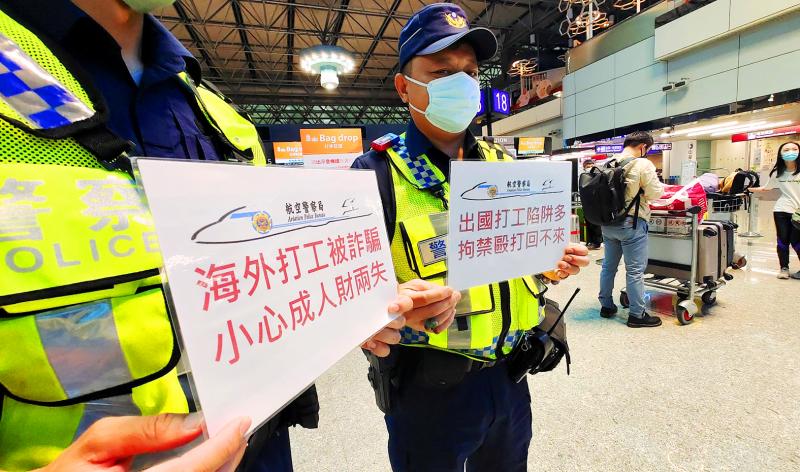The Control Yuan has said it would investigate reports that some Taiwanese were imprisoned, tortured, sexually assaulted and threatened with organ harvesting after accepting part-time jobs in Cambodia and Myanmar.
Control Yuan members Yeh Ta-hua (葉大華) and Chi Hui-jung (紀惠容) said Taiwanese might be being trafficked in the two countries.
Local media have over the past few months reported that trafficking rings and human resources agencies have been placing job advertisements on social media for positions such as customer service workers or casino staff in Southeast Asian countries, Yeh said.

Photo: Yao Chieh-hsiu, Taipei Times
However, once there, Taiwanese have had their personal documents seized and been forced to work for gangs, she said.
Some have been tortured with electric shocks, while others have been sexually assaulted and threatened to have their organs harvested, she added.
The Control Yuan has received a petition saying that young people from social welfare institutions have been defrauded after accepting work in Cambodia and some have disappeared, with families unable to confirm if they are safe, she said.
Yeh and Chi questioned whether authorities know how many Taiwanese are working abroad under such conditions.
They also asked whether the government can provide aid and if strategies to help such victims have been drafted.
Separately, the Aviation Police Bureau said it has been interviewing young people checking in for flights to Cambodia and providing information about the suspected trafficking rings to prevent Taiwanese falling victim to fraudulent job offers.
However, some criminal rings started to ask jobseekers to travel to Cambodia via Thailand to evade the bureau’s efforts, it said.
As a result, the bureau assigned officers to check-in desks and boarding gates for flights to Bangkok, it added.
The bureau’s Security and Patrol Brigade on Friday dissuaded a person surnamed Chen (陳) from traveling to Cambodia via Thailand for work, the bureau said.
Police have since July 20 stopped 23 people from boarding planes at Taiwan Taoyuan International Airport to work overseas, it said, adding that people must research the employers before accepting jobs abroad.
Lu Chiu-yuan (呂秋遠), a lawyer who specializes in similar cases, on Sunday said on Facebook that 10 trafficking victims have asked for his help.
Among those who have sought help are a couple who said their mobile phones and passports were confiscated upon landing in Cambodia last month.
The woman said she was sexually assaulted and was told she would be beaten up and her organs removed if they sought help, Lu said.
Many victims have been forced into prostitution or working in mines, he said.
Local police often collude with the syndicates and victims who seek help from police are often returned to the criminals for punishment, he said.
Taiwan does not have a representative office in Cambodia, so the safest way out of such situations is to pay a ransom, which requires family members to fly there, Lu said.
The Taipei Economic and Cultural Office in Vietnam might help connect families with trustworthy police officials in Cambodia to help handle such matters, he added.

AGING: As of last month, people aged 65 or older accounted for 20.06 percent of the total population and the number of couples who got married fell by 18,685 from 2024 Taiwan has surpassed South Korea as the country least willing to have children, with an annual crude birthrate of 4.62 per 1,000 people, Ministry of the Interior data showed yesterday. The nation was previously ranked the second-lowest country in terms of total fertility rate, or the average number of children a woman has in her lifetime. However, South Korea’s fertility rate began to recover from 2023, with total fertility rate rising from 0.72 and estimated to reach 0.82 to 0.85 by last year, and the crude birthrate projected at 6.7 per 1,000 people. Japan’s crude birthrate was projected to fall below six,

Conflict with Taiwan could leave China with “massive economic disruption, catastrophic military losses, significant social unrest, and devastating sanctions,” a US think tank said in a report released on Monday. The German Marshall Fund released a report titled If China Attacks Taiwan: The Consequences for China of “Minor Conflict” and “Major War” Scenarios. The report details the “massive” economic, military, social and international costs to China in the event of a minor conflict or major war with Taiwan, estimating that the Chinese People’s Liberation Army (PLA) could sustain losses of more than half of its active-duty ground forces, including 100,000 troops. Understanding Chinese

SELF-DEFENSE: Tokyo has accelerated its spending goal and its defense minister said the nation needs to discuss whether it should develop nuclear-powered submarines China is ramping up objections to what it sees as Japan’s desire to acquire nuclear weapons, despite Tokyo’s longstanding renunciation of such arms, deepening another fissure in the two neighbors’ increasingly tense ties. In what appears to be a concerted effort, China’s foreign and defense ministries issued statements on Thursday condemning alleged remilitarism efforts by Tokyo. The remarks came as two of the country’s top think tanks jointly issued a 29-page report framing actions by “right-wing forces” in Japan as posing a “serious threat” to world peace. While that report did not define “right-wing forces,” the Chinese Ministry of Foreign Affairs was

US President Donald Trump in an interview with the New York Times published on Thursday said that “it’s up to” Chinese President Xi Jinping (習近平) what China does on Taiwan, but that he would be “very unhappy” with a change in the “status quo.” “He [Xi] considers it to be a part of China, and that’s up to him what he’s going to be doing, but I’ve expressed to him that I would be very unhappy if he did that, and I don’t think he’ll do that. I hope he doesn’t do that,” Trump said. Trump made the comments in the context